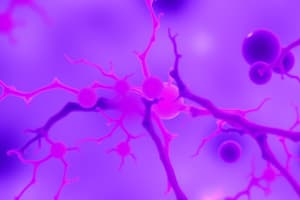Podcast
Questions and Answers
What happens to cells when nutrition is restricted?
What happens to cells when nutrition is restricted?
- Cells increase in size
- Cells become atrophic (correct)
- Cells remain unchanged
- Cells die instantly
What is ischemia?
What is ischemia?
A condition of decreased blood flow to tissues.
Most cells of the body are efficient.
Most cells of the body are efficient.
True (A)
What is hypertrophy?
What is hypertrophy?
What is one common cause of left ventricular hypertrophy?
What is one common cause of left ventricular hypertrophy?
What is disuse atrophy?
What is disuse atrophy?
The increase in cell number is termed _____.
The increase in cell number is termed _____.
Match the type of atrophy with its description:
Match the type of atrophy with its description:
What is metaplasia?
What is metaplasia?
Muscle cells can undergo mitotic division.
Muscle cells can undergo mitotic division.
Study Notes
Cell Response to Stress, Injury, & Aging
- Inadequate nutrition triggers cellular atrophy, facilitating survival with limited resources.
- Cell efficiency: Most cells are capable of remarkable adaptability when faced with increased demands, such as size increase or proliferation.
- Cells can exhibit reversible changes in response to adverse conditions through gene expression modulation.
- Adaptations may involve changes in cell size, number, and differentiation into different cell types.
- If stressors are insurmountable, cells may undergo apoptosis or necrosis, leading to cell death.
Atrophy
- Atrophy refers to a reduction in cell size, impacting the overall size of organs or tissues.
- Advantages of atrophy include decreased oxygen consumption and resource utilization due to smaller and fewer organelles.
- Common types of atrophy include disuse atrophy (muscle cells affected by immobility or casting) and denervation atrophy (loss of nerve stimulation).
Hypertrophy
- Hypertrophy is the increase in organ or tissue size due to heightened demand, primarily observed in muscle tissues like cardiac and skeletal muscles.
- Normal physiological hypertrophy occurs with increased workload, such as from exercise.
- Adaptive hypertrophy is seen when there is a thickening of an organ, e.g., urinary bladder due to outflow obstruction.
- Compensatory hypertrophy can occur, e.g., the enlargement of one kidney following the removal of another.
Hyperplasia and Related Terms
- Hyperplasia involves an increase in cell number, typically in organs capable of mitotic division, excluding muscle cells and neurons.
- Metaplasia is characterized by the reversible transformation from one cell type to another.
- Dysplasia signifies deranged cell growth, resulting in abnormal cell shapes, sizes, and organization.
Hormonal Influence on Atrophy and Hypertrophy
- Hormonal changes can significantly impact tissue and organ size, notably:
- Decreased estrogen levels, such as during menopause, can lead to breast and reproductive organ atrophy.
- Testosterone abuse may cause testicular atrophy.
Studying That Suits You
Use AI to generate personalized quizzes and flashcards to suit your learning preferences.
Description
This quiz explores how cells respond to stress, injury, and aging with a focus on inadequate nutrition. Learn about cellular atrophy, ischemia, and the efficiency of cells in adapting to their internal environments. Test your understanding of these critical biological processes.




